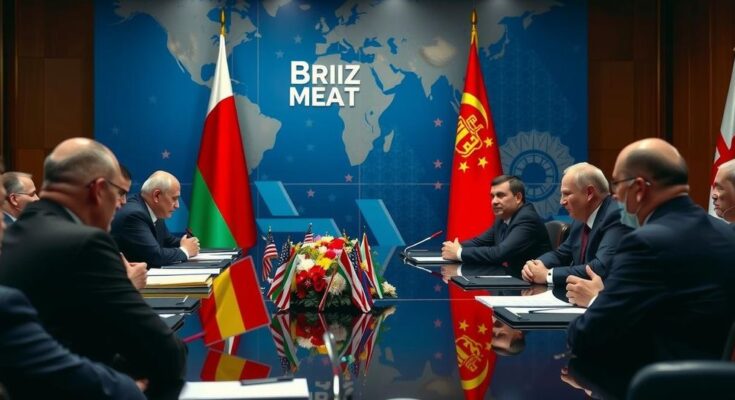The BRICS summit in Kazan, led by President Putin, focused on enhancing cooperation among member nations and addressing geopolitical tensions, particularly the conflict in Ukraine. Key discussions included the establishment of alternative financial systems to reduce reliance on Western structures. The event highlighted the expansion of the BRICS bloc and its ambitions to counter Western influence globally.
During the recent BRICS summit convened in Kazan, Russia, President Vladimir Putin presided over a significant dialogue between member nations focused on enhancing cooperation and addressing challenges posed by the West. Notably, the summit included leaders from China, India, South Africa, and other developing economies, signaling an ambition to bolster Russia’s influence globally amid ongoing tensions surrounding its actions in Ukraine. President Xi Jinping of China urged the necessity of avoiding escalation in the Ukraine conflict, advocating for diplomatic solutions and international collaboration. Putin, addressing the assembly, commended BRICS as a formidable counterbalance to Western hegemony, criticizing what he termed the perverse methods employed by the West—including unilateral sanctions and economic manipulation—that exacerbate tensions and foster conflict. He emphasized the bloc’s role in fostering financial cooperation, including efforts to create alternatives to the SWIFT payment system, which would enable countries like Russia to circumvent prevailing sanctions and enhance trade relations. The extensive participation of representatives from 36 nations underscored the collective resistance against Western attempts to isolate Russia. The BRICS bloc has grown since its inception, integrating new members like Iran, Egypt, and Saudi Arabia, with others such as Turkey and Malaysia expressing interest in joining. This expansion reflects the shifting dynamics in global leadership and economic alliances. Despite the block’s intentions, the ongoing hostilities in Ukraine linger as a pertinent issue, with President Xi’s remarks on promoting de-escalation efforts garnering attention, though Ukraine has consistently rejected any peace proposals put forth by BRICS leaders. The event culminated in a joint declaration reiterating the commitment to enhancing financial collaboration within the bloc, while also addressing the negative impacts of existing sanctions on global economic stability. The summit concluded with assertions from both Russian state media and international observers regarding its implications for the United States and its allies, portraying an image of solidarity among emerging economies opposed to Western dominance in global affairs. Analysts suggest this summit may mark a significant pivot in international relations, amplifying the voice and influence of nations within the Global South.
The BRICS alliance, initially founded by Brazil, Russia, India, China, and South Africa in 2009, has grown considerably in size and influence. The bloc aims to provide a counterweight to Western-dominated economic and political structures, particularly in light of ongoing geopolitical tensions, such as the conflict in Ukraine. Over the years, BRICS has expanded to include nations like Iran, Egypt, and Saudi Arabia, illustrating a collective pivot towards fostering cooperation among developing countries. This summit served to highlight Russia’s strategy to consolidate its leadership role within this emerging bloc, while simultaneously addressing its international isolationism stemming from sanctions and political pressures emanating from the West.
The recent BRICS summit in Kazan illustrated both the aspirations and challenges facing Russia as it seeks to expand its influence among developing economies. Through collaborative discussions on financial cooperation and geopolitical stability, Russia aims to present itself as a leading figure against Western economic dominance while fostering partnerships that could reshape global power dynamics. However, ongoing conflicts, particularly in Ukraine, continue to pose hurdles to achieving these objectives and maintaining unity within the bloc.
Original Source: apnews.com




